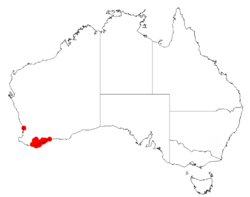Biology:Acacia leioderma
| Porongurup wattle | |
|---|---|
| Scientific classification | |
| Kingdom: | Plantae |
| Clade: | Tracheophytes |
| Clade: | Angiosperms |
| Clade: | Eudicots |
| Clade: | Rosids |
| Order: | Fabales |
| Family: | Fabaceae |
| Subfamily: | Caesalpinioideae |
| Clade: | Mimosoid clade |
| Genus: | Acacia |
| Species: | A. leioderma
|
| Binomial name | |
| Acacia leioderma Maslin, 1975
| |

| |
| Occurrence data from AVH | |
Acacia leioderma also commonly known as the Porongurup wattle[1] is a species of wattle which is endemic to an area in the lower Great Southern region of Western Australia centered on Albany.[2]
An erect shrub that typically grows to a height of between 0.5 and 2 metres (2 and 7 ft), it has red to brown glabrous branchlets that are prominently ribbed with stipules 2.5 to 4 millimetres (0.098 to 0.157 in) long.[3] It has small, fern-like green phyllodes (leaves) and light golden flowers.[1] Flowers appear between April and November.[2]
The plant's range extends as far west as Walpole, east as Esperance and north as the Porongurup Range. It grows in sand, loam and clay soils and is found along granite outcrops.[2]
Acacia leioderma is one of the main understorey species found in the open forest on the lower slopes of the Porongurup Range.[4]
See also
References
- ↑ Jump up to: 1.0 1.1 "Acacia leioderma - Porongurup Wattle". nindethana. http://www.nindethana.net.au/product-detail.aspx?p=176. Retrieved 4 January 2016.
- ↑ Jump up to: 2.0 2.1 2.2 "Acacia leioderma". FloraBase. Western Australian Government Department of Parks and Wildlife. https://florabase.dpaw.wa.gov.au/browse/profile/3413.
- ↑ "Acacia leioderma". World Wide Wattle. http://worldwidewattle.com/speciesgallery/leioderma.php?id=3413. Retrieved 4 January 2016.
- ↑ "National Heritage List Assessment of Porongurup National Park". Australian Government. 9 July 2007. https://www.environment.gov.au/system/files/pages/93b43549-63d5-4407-8815-c019a2263699/files/porongurup.pdf. Retrieved 4 January 2016.
Wikidata ☰ Q9566182 entry
 |

